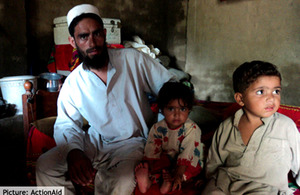After the floods: returning home in northern Pakistan
How UKaid funded relief packages have helped families move back to their villages

Izzat Khan and his 2 children in their rented house. Picture: ActionAid
Relief packages, funded by UKaid from the Department for International Development, are helping families in northern Pakistan resettle in their homes.
Izzat Khan had no warning about the floods that were about to sweep through his village.
With no TV or radio to alert him to the unfolding disaster, he and his family didnãt have time to save their belongings or to avoid the ice cold water.
ãIn the evening we were home and doing our usual chores,ã says Izzat.
ãSuddenly the boundary wall started to shake, and before I knew it, it collapsed and a big flash of water gushed into my house.
ãWe got hold of our children and ran outside. Village people helped us get to a safe place and from there we walked to my uncleãs house.ã
Izzat Khanãs wife, Khapay Rai, slipped into the knee-high water as she tried to escape.
ãI was shivering, out of fear and cold,ã she says.
ãI thought I was going to drown in the water. I was worried for my husband and young children. Thank God the village people helped us otherwise we wouldnãt have survived.ã
No boundary wall, no possessions
A week after the major flood, Izzat, Khapay Ria, 2 year-old Summaya and 3 year-old Salman returned to their home.
All of their possessions had gone or were covered in thick mud. The boundary wall had been completely washed away and food stocks, cooking pots, bedding and clothes had all been lost.
To help them resettle in their home, Izzat and Khapay Ria were given a relief packageô containing cooking oil, a wheat bag, pulses, sugar, biscuits, pots, pans, soaps and bedding.
UK aid, from the Department for International Development, funded the relief packagesô via the Consortium of British Humanitarian Agencies (CBHA). The packages were distributed by ActionAid in Upper Swat,ô an area which was badly affected by the flooding.
ãWe received Atta (wheat), oil and cooking pans, so at least we were able to eat something,ã says Izzat.ô
ãWe use the wheat sparingly; we donãt want to run out too soon.ã
Rebuild and restore
The floods have had a massive economic impact on the country - agricultural land, crops, livestock and small businesses have all been severely affected.ô
Before the floods, Khapay Rai provided for her family by stitching and sewing clothes for people inô the village. But her sewing machine was washed away when the water swept through her house.
ãThe flood took away my scissors, threads and sewing machine,ã she says.
ãMy father gave me the sewing machine in my dowry - now that it is gone, I worry how I will make a living.
ãEarlier my husband would find occasional work in the city, such as offloading goods from trucks, cleaning tables at nearby tuck shops and helping manufacture Jala (local boats). Now I fear there wonãt be any work for a long time.ã
The UK aid funded relief packages have helped Izzatô andô Khapay Raiô and other families in Upper Swatô to resettle in their villages. But they will need continued support in order to rebuild and restore their livelihoods as the floods subside.
Facts and stats
Although some families are starting to return home in northern Pakistan, around 1.8 million houses have been destroyed or damaged by the floods and parts of southern Pakistan are still under 4 feet of water.
Around 21 million people have been affected by the floods and 12.5 million are in need of immediate humanitarian assistance.
CBHAô is a consortium of 15 British NGOs including ActionAid, Action against Hunger, CARE International UK, CAFOD, Christian Aid, Concern Worldwide UK, HelpAge International, International Rescue Committee UK, Islamic Relief Worldwide, Merlin, Oxfam GB, Plan International UK, Save the Children UK, Tearfund and World Vision UK.